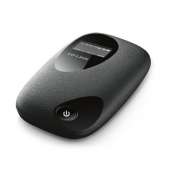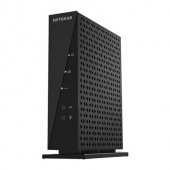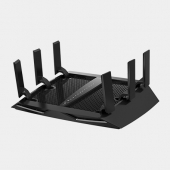-
Would You Like a Backdoor With That Linksys Router, Sir?
Linksys says that 25 router models are vulnerable to remote hacking and could be taken over by an attacker if users still use their default admin credentials.
- April 22, 2017
- 02:50 AM
 1
1
-
Home Routers Used to Hack WordPress Sites
There's a group of hackers who are hijacking unsecured home routers and using these devices to launch coordinated brute-force attacks on the administration panel of WordPress sites.
- April 12, 2017
- 06:13 AM
 1
1
-
Epic Fail: TP-Link 3G Router Spews Admin Password via SMS
A particular TP-Link router model will spew out its admin password in cleatext to anyone that sends an SMS message to the router's SIM card with a particular script inside, according to German security researcher Jan Hörsch.
- April 10, 2017
- 10:17 AM
 0
0
-
Ubiquiti Devices Exposed to Hacking via 20-Years-Old PHP Version
Some Ubiquiti network device models can be hacked thanks to an unpatched vulnerability, allowing attackers to gain control over the device, or use it as a pivot point in the victim's network to hack other nearby equipment.
- March 17, 2017
- 06:01 AM
 0
0
-
31 Netgear Router Models Affected by Flaw That Exposes Admin Password
Netgear has issued patches that resolve a simple bug in the firmware of 20 different router models that allow an attacker to expose the router's web panel admin password, which they can use to take over the device.
- January 31, 2017
- 01:05 PM
 0
0
-
FTC Takes D-Link to Court Because of Insecure Routers and Cameras
The US Federal Trade Commission (FTC) has filed a lawsuit against D-Link, a Taiwanese hardware manufacturer, for misrepresentations about the security of various devices it sold in the US, and for failing to take action and secure devices when security flaws were reported.
- January 06, 2017
- 09:31 AM
 1
1
-
Switcher Android Malware Hacks TP-Link Routers, Changes DNS Settings
An Android trojan named Switcher (Trojan.AndroidOS.Switcher) targets Android devices in order to take over local WiFi routers and hijack the web traffic passing through them.
- December 28, 2016
- 08:20 AM
 0
0
-
ZyXEL and Netgear Fail to Patch Seven Security Flaws Affecting Their Routers
Router manufacturers such as Netgear and ZyXEL have failed to address seven security flaws reported by security researchers in the last three or more months.
- December 26, 2016
- 08:40 AM
 2
2
-
Malvertising Campaign Infects Your Router Instead of Your Browser
Malicious ads are serving exploit code to infect routers, instead of browsers, in order to insert ads in every site users are visiting. Discovered by security researchers from US security firm Proofpoint, this malvertising campaign is powered by a new exploit kit called DNSChanger EK.
- December 14, 2016
- 05:00 AM
 1
1
-
Netgear Expands List of Vulnerable Routers, Starts Issuing Firmware Updates
Netgear has expanded the list of routers vulnerable to a simple yet dangerous exploit that came to light last week, and which is trivial to weaponize and allows attackers to take control over affected devices.
- December 13, 2016
- 11:55 AM
 0
0
-
CERT Warns Users to Stop Using Two Netgear Router Models Due to Security Flaw
The United States Computer Emergency Readiness Team (US-CERT), an organization within the Department of Homeland Security (DHS), has published a security alert yesterday, warning owners of Netgear R6400 and R7000 models against using their routers for the time being, because of a severe security flaw.
- December 10, 2016
- 04:02 AM
 4
4
-
ISP Asks Security Researcher for Help in Regaining Control over 15,000 Routers
Around six months ago, an Internet service provider (ISP) doing business in the Middle East was forced to ask a security researcher for help in order to regain access to over 15,000 routers it was about to lose control of.
- December 07, 2016
- 02:31 PM
 1
1
-
Mirai Botnet Behind Internet Problems for 100,000 TalkTalk and UK Post Office Users
Over 100,000 UK Internet customers had connectivity problems over the weekend, with most of the affected users being clients of the UK Postal Office, TalkTalk, and Kcom ISPs.
- December 02, 2016
- 09:01 AM
 0
0
-
900,000 Routers Knocked Offline in Germany amid Rumors of Cyber-Attack
For two days now, over 900,000 routers belonging to Deutsche Telekom users in Germany have been knocked offline following a supposed cyber-attack.
- November 28, 2016
- 10:47 AM
 0
0
-
Security Firm Detects 57M Attempts to Exploit 2-Year-Old Router Firmware Backdoor
The case of the Netis router firmware backdoor shows you that even if a company puts out a patch to resolve security issues, the problem lingers on for years, as users fail to update their devices, or the patch itself fails to properly fix the issue.
- November 21, 2016
- 02:53 PM
 0
0
-
Netgear Routers under Attack. Learn how to Protect Yourself!
Threatpost has reported that there is a publicly disclosed vulnerability in Netgear routers is currently being used by attackers to modify a router's DNS entries. All users of Netgear routers should immediately disable Remote Administration. with instructions found in this article.
- October 08, 2015
- 04:29 PM
 4
4
 1
1




















